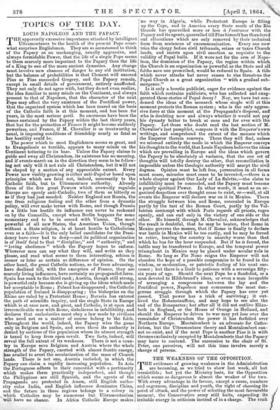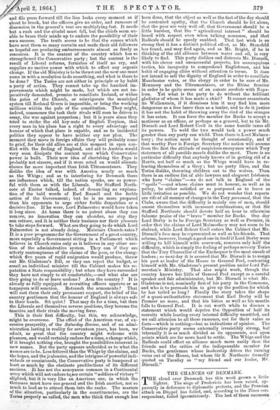about to break, but the officers give no order, and
rumours of dissension in the general's tent are multiplying fast. It needs but a rush and the citadel must fall, but the chiefs seem un- able to brace their minds up to endure the possibility of their own success. The truth seems to be that the causes which have sent them so many recruits and made their old followers so hopeful are producing embarrassments almost as freely as resources. It is the content of the country which has so strengthened the Conservative party ; but the content is the result of Liberal reforms, furnishes of itself no cry, and supplies no motive power with which to effect any organic change. If the old Ministry is to be thrust out the new one must come in with a resolution to do something, and what is there to be done ? The Tories are not either in principle or by habit a party of action. They cannot take up the hundred im- provements which might be made, but which are not im- peratively demanded, promise to conciliate Ireland, or widen the gates of the Church, or reinvigorate the municipal system till Bethnal Green is impossible, or bring the working millions within the pale of the constitution. They might, indeed, commence the task their rivals will soon be driven to essay, the war against pauperism ; but it is years since they tried to strike the old key-note of English Toryism, that every man in his place has a right to every advantage and honour of which that place is capable, and as to incidental politics they appear to have neither cry nor plan. The moment they move in foreign affairs they will probably come to grief, for their old allies are at this moment in open con- flict with the feeling of England, and aid to Austria would very soon dissipate the content upon which Conservative power is built. Their new idea of cherishing the Pope is probably not sincere, and if it were acted on would alienate classes far more important than Irish Ultramontanes. They dislike the idea of war with America nearly as much as the Whigs ; and as to interfering for Denmark there are influences which, till the nation speaks, are as power- ful with them as with the Liberals. Sir Stafford North- cote at Exeter talked, indeed, of demanding an explana- tion of the bold words of Earl Russell and the feeble action of the Government; but he is no more prepared than his opponents to urge either feeble despatches or a decisive line. If he were, Lord Palmerston would have taken it long since. At home there is no patent abuse they can remove, no innovation they can abandon, no step they can retrace, and it is neither their business nor their pleasure to take steps forward. What are they going to do which Lord Palmerston is not already doing. Maintain Church-rates ? It is a poor programme for the Government of a great count/7, more especially a Government sitting in a Parliament which believes in Church-rates only as it believes in any other sec- tion of the administrative system. They can if they are utterly contemptuous of the claims of the poor, or the change which five years of rapid emigration would produce throw out Mr. Gladstone's Bill, or they can reject the budget, or assail an individual minister till the Cabinet makes his re- putation a State responsibility ; but when they have succeeded they have not simply to sit comfortable,—and what else are they going to do or leave undone ? Arm the country ? It is already as fully equipped as recruiting officers approve or as taxpayers will sanction. Retrench the armaments ? That will cost them their only permanent support, the belief of the country gentlemen that the honour of England is always safe in their hands. Sit quiet? That may do for a time, but then the Liberals and themselves reverse positions, they become the inactive and their rivals the moving force.
This is their first difficulty, but this, we acknowledge, might be overcome. The effect of the American war, of ex- cessive prosperity, of the Saturday Review, and of an admi- nistration lasting in reality for seventeen years, has been, we admit, so great that the country might welcome with pleasure, and would certainly endure for a time a change which, if it brought nothing else, brought the possibilities inherent in new names. But the party appears undecided as to what the names are to be. Less fettered than the Whigs by the claims, and the hopes, and the jealousies' and the intrigues of powerful indi- viduals or cousinhoods, the Conservative party is hampered at least as much by the obstinate predilections of its different sections. It has not the annoyance common in a Continental army which will not endure to.see certain "soldiers of victory" slighted, but it is very like an American one, in which the Germans must have one general and the Irish another, not so much to lead as to attract them into the ranks. The masters of the situation, particularly in the constituencies, are the Tories properly so called, the men who think that enough has been done, that the object as well as the fact of the day should be contented apathy, that the Church should be let alone, that the poor are very well off, that Government should be a little harsher, that the " agricultural interest " should be heard with respect even when talking nonsense, and that Radicals should be openly snubbed. That last wish is so strong that it has a distinct political effect, as Mr. Stansfeld has found, and may find again, and as Mr. Bright, if he is thinking of the old alliance between water and oil, is very likely to find. This party dislikes and distrusts Mr. Disraeli, with his clever and unsuccessful projects, his unscrupulous tactics, his incapacity to comprehend Englishmen, and his habit of engaging allies without attention to terms. It does not intend to sell the dignity of England in order to conciliate Manchester votes, or the clergy in order to be sure of Mr. Hennessy and the Ultramontanes, or the Rhine frontier in order to be quite secure of an entente cordials with Napo- leon. Yet what is the party to do without the brilliant gladiator of whom it has made a chief? It cannot assassinate its Wallenstein, if it dismisses him it may find him more dangerous as a free lance than as a leader, and to do it justice it has not the habit of throwing away the rind of the oranges it has eaten. It can force the member for Bucks to accept a mutineer as an officer, or perhaps as a general, but to tie Mr. Disraeli and Lord Robert Cecil in the same bundle taxes all its powers. To weld the two would task a power much greater than any party can wield. Then there is Lord Malmes- bury ; the nation must be thought of occasionally, and if that worthy Peer is Foreign Secretary the nation will assume from the first the attitude of suspicious annoyance which Tory statesmen of all possible moods dislike the most. There is no particular difficulty that anybody knows of in getting rid of a Harris, not half so much as the Whigs would have in re- leasing themselves of a Grey ; but no party likes, and the Tories dislike, throwing children out to the wolves. Then there is an endless list of able lawyers and eloquent Irishmen who have " claims "—we do not talk in England of the "spoils "—and whose claims must in honour, as well as in policy, be either satisfied or so postponed as to leave as little irritation as possible. We do not wonder that reports are rife of all manner of changes in the Tory personnel, that the Clubs, aware that the difficulty is mainly one of men, should amuse themselves with incessant combinations, or that Sir Stafford Northcote should devote half an hour to otherwise fulsome praise of the " brave " member for Bucks. One day Lid Derby is to be Foreign Secretary as well as Premier, in order that the claims of Lord Malmesbury may not seem to be shelved, while Lord Robert Cecil enters the Cabinet that Mr. Disraeli's foes may be represented as well as his friends. That scheme, however, though a good one in itself if Lord Derby were willing to kill himself with overwork, removes only half the difficulty, which is simply the feeling of perhaps seventy Tories that the Tory Chancellor of the Exchequer is the most unsafe of leaders ; so next day it is averred that Mr. Disraeli is to resign his post as leader of the House to General Peel, contenting himself with Mr. Gladstone's present position under Lord Pal- merston's Ministry. That also might work, though the country knows but little of General Peel except as a careful speaker and fair administrator, but Mr. Disraeli is what Mr. Gladstone is not, nominally first of his party in the Commons, and who is to persuade him to give up the position for which he has toiled so long ? Finally the story takes the shape of a quasi-authoritative statement that Earl Derby will be Premier no more, and that his baton as well as his mantle falls to General Peel. It is not worth while to discuss a statement which would deprive the Opposition of half its recruits while leaving every internal difficulty unsettled, and we call attention to all these rumours, not for their value as facts—which is nothing—but as indications of opinion. The Conservative party seems externally irresistibly strong, but internally it is as much divided as its opponents, and upon points which are far more hard to settle. The Whigs and the Radicals could effect an alliance much more easily than the friends and the critics of the indispensable member for Bucks, the gentleman whose leadership drives the turning votes out of the House, but whom Sir S. Northcote. formally quoted on Tuesday as "my friend and our leader, Mr. Disraeli."



































 Previous page
Previous page